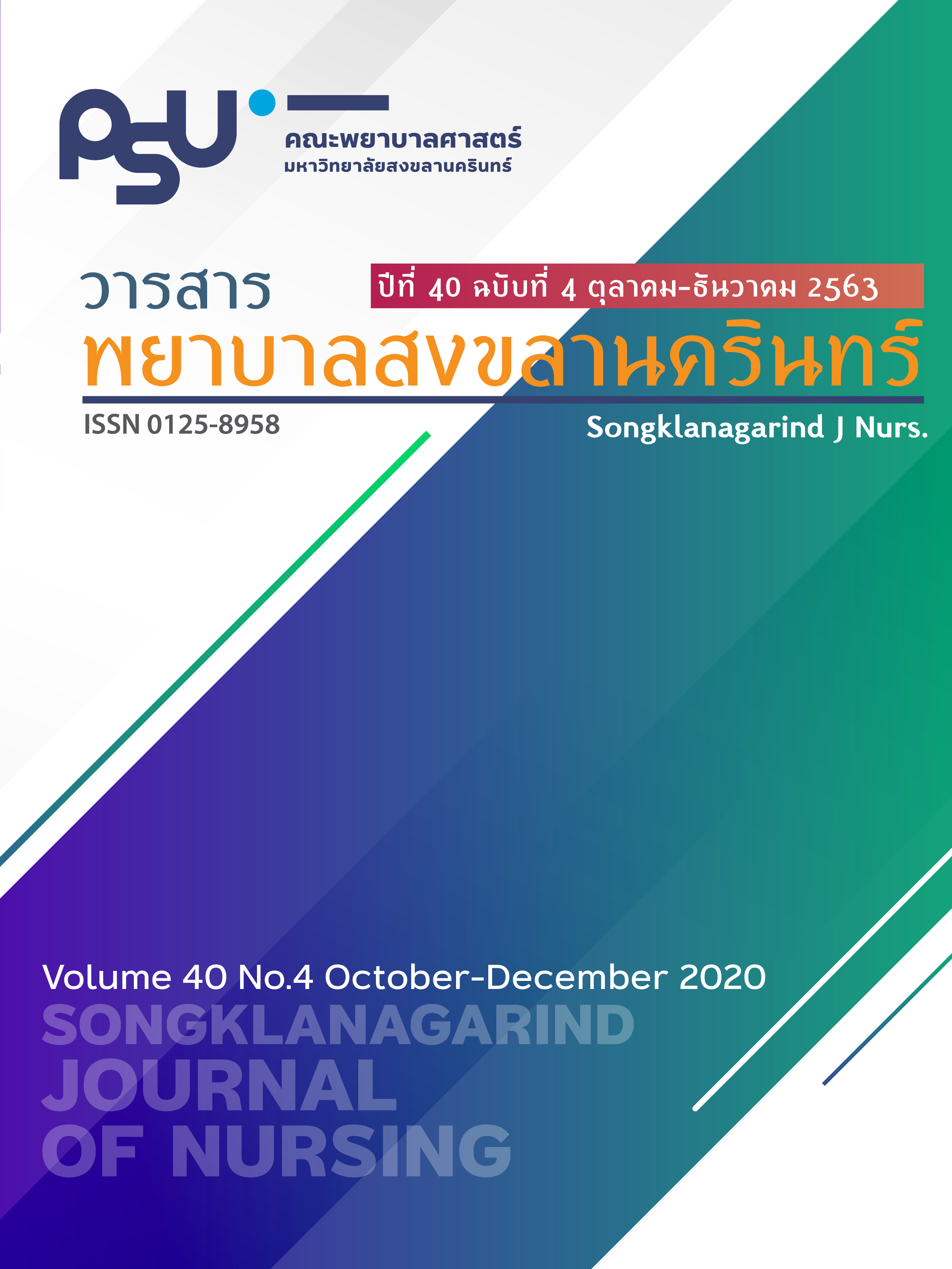Development of Sense of Coherence Promoting Program Using Empowerment Process with Family Support for Older Adult Muslims with Chronic Kidney Disease Undergoing Hemodialysis
Main Article Content
Abstract
This study aims to develop of the sense of coherence promoting program using empowerment process with family support by applying the concept of empowerment family support, and sense of coherence of Antonovsky. The program development process was divided into two phases 1) program development, and 2) program evaluation. The results of the study showed that the program consisted of four activities; 1) accepting and understanding the problem 2) enhancing strength by family 3) solving the problems together and 4) home visit. The program was tested for content validity by three experts resulting in a CVI of 0.8. The experts suggested that the program should emphasize participations of family activities. The feasibility assessment of the program was tested by three nephrology nurses who work in hemodialysis unit. The results found that all of these nurses reported that the program was practical. Thus, the program should be tested for effectiveness by conducting further experimental research in older adult Muslims with chronic kidney disease receiving hemodialysis.
Article Details
References
Nationnal Statisticcal Office. Farming Census 1-30 May 2013 [internet] Public relations group Bureau of English Forecasting Statistics. [cited 2014 Jun 1]. Available from: http://service.nso.go.th/nso/nsopublish/pubs/sns/5510-12.pdf.
Khajehdehi P, Malekmakan L, Pakfetrat M, et al. Prevalence of chronic kidney disease and its contributing risk factors in southern Iran: A cross-sectional adult population-based study. Iran J Kidney Dis. 2014; 8(2): 109-15.
Chaiyasung P, Meetong P. Factors predicting chronic kidney disease of patients with chronic disease in the community. J Prapokklao Hosp Clin Med Educat Center. 2018; 35(2): 128-39. Thai
Paksee P, Uma A, Arunothayanan W. Sefl-care behaviors of the elderly, Su-ngai Padi District, Narathiwat Province. Thonburi Rajabhat Research Journal Service to Society. 2017; 3(1): 145-59. Thai.
Rasamejam P, Akaratanapol P, L imteerayos P, et al. Factors predict health promotion behaviors among Thai Muslim with hypertension. Journal of Nursing, Siam University. 2018; 19(37): 56-68. Thai.
Makeng M, Jittanoon P, Buapetch A. The effect of Muslim-based health behavior modification program on diabetic control behaviors and blood sugar level of uncontrolled DM Muslim patients with co-morbidity. Songklanagarind J Nurs. 2018; 38(1): 46-62.Thai.
Nephrothai. Clinical practice recommendation for the evaluation and management of chronic kidney disease in adults 2015 [Internet] 2015 [cited 2020 Mar 13]. Available from: http://www.nephrothai.org/images/10-11-2016/Final_%E0%B8%84%E0%B8%A1%E0%B8%AD_CKD_2015.pdf.
Antonovsky A. Unraveling the mystery of health: How people manage stress and stay well. San Francisco, CA, US: Jossey-Bass;1987.
Chaiyawan S. Sense of coherence and acting on behalf of patients of psychiatric nurse. [Thesis]. [Songkla]: Prince of Songkla University; 2007. Thai.
Preyawanich J, Thaniwatananon P, Kongin W. Relationships between understanding of Muslim caregivers of stressful situation, perception of spiritual needs of Muslim patients on mechanical ventilation and participation of caregivers in spiritual care of Muslim patients. Songkla Med J. 2007; 25(6): 471-80. Thai.
Wae-ali D. Illness and treatment in Islam. In: Wae-ali D., Editors. The best care of the elderly according to the Islamic guidelines.Bangkok: OS Printing House. 2004.
Poomsanguan K. Health empowerment: Nurses’ importan role. Journal of The Royal Thai Army Nurses. 2014; 15(3): 86-90. Thai.
Gibson CH. A concept analysis of empowerment. J Adv Nurs. 1991; 16(3): 354-61. doi: 10.1111/j.1365-2648.1991.tb01660.x.
House JS, Kahn RL, McLeod JD, et al. Measures and concepts of social support. social support and health. San Diego, CA, US: Academic Press; 1985. p.83-108.
Yotpanya D. The effect of sense of coherence promoting program on quality of life of schizophrenic patients’caregivers in community. [Thesis]. [Bangkok]: Chulalongkorn University; 2012. 157 p.
Eriksson M, Lindstrom B. Antonovsky’s sense of coherence scale and its relation with quality of life: A systematic review. J Epidemiol Community Health 2007; 61(11): 938-44. doi:10.1136/jech.2006.056028.
Kristofferzon ML, Engstrom M, Nilsson A. Coping mediates the relationship between sense of coherence and mental quality of life in patients with chronic illness: A cross-sectional study. Qual Life Res. 2018; 27(7): 1855-63. doi: 10.1007/s11136-018-1845-0.
The Joannal Briggs Institute. Joanna brigss institue reviewer’s manual : 2014 edition. Australia by Solito Fine colour Printers. The Joanna Briggs Institute. 2014.
Poppe C, Crombez G, Hanoulle I, et al. Improving quality of life in patients with chronic kidney disease:
Influence of acceptance and personality. Nephrol Dial Transplant. 2013; 28(1): 116-21. doi: 10.1093/ndt/gfs151.
Martz E, Livneh H. Coping with chronic illness and disability: Theoretical, empirical, and clinical; 2007.
Kaltsouda A, Skapinakis P, Damigos D, et al. Defensive coping and health-related quality of life in chronic kidney disease: A cross-sectional study. BMC Nephrology. 2011; 12(1): 28. doi: 10.1186/1471-2369-12-28.
Eriksson M, Lindström B. Antonovsky’s sense of coherence scale and its relation with quality of life: A systematic review. J Epidemiol Community Health. 2007; 61(11): 938-44. doi: 10.1136/jech.2006.056028.
Nilphat T. The outcomes of empowerment program on knowledge and self care behaviors in patient with continuous ambulatory peritoneal dialysis, Suratthani Hospital. Region 11 Medical Journal. 2015; 29(4): 557-69. Thai.
Jintana P, Sriyuktasuth A, Pongthavornkomol K, et al. Information-motivation-behavioral skills program improved phosphate binder adherence in patients with chronic hemodialysis. Nurs Sci J Thail. 2016; 34(2): 92-101.
Thai.
Pongkerd R. The effect of empowerment program on self care behaviors in the older persons with chronic kidney disease receiving continuous ambulatory peritoneal dialysis. Master of Nursing Science Program in Nursing Science [Thesis]. [Bangkok]: Chulalongkorn University; 2014. Thai. 182 p.
Khamying W, Khamying W. The effect of empowerment progarm on sense of coherence in patients with advanced cancer. Journal of Nursing Science and Health. 2012; 35(3): 37-47.Thai.
Chulabat P. Relationship between sense of coherence and quality of life in patients with chronic kidney disease receiving hemodialysis [Thesis]. [Bangkok]: Christian University; 2008.
Lee SJ. An empowerment program to improve self-management in patient with chronic kidney disease. Korean J Adult Nurs. 2018; 30(4): 426-36. doi: 10.7475/kjan.2018.30.4.426.
Silva SM, Braido NF, Ottaviani AC, et al. Socail support of adults and elderly with chronic kidney disease on dialysis. Rev Lat Am Enfermagem. 2016; 24: e2752. doi: 10.1590/1518-8345.0411.2752.


